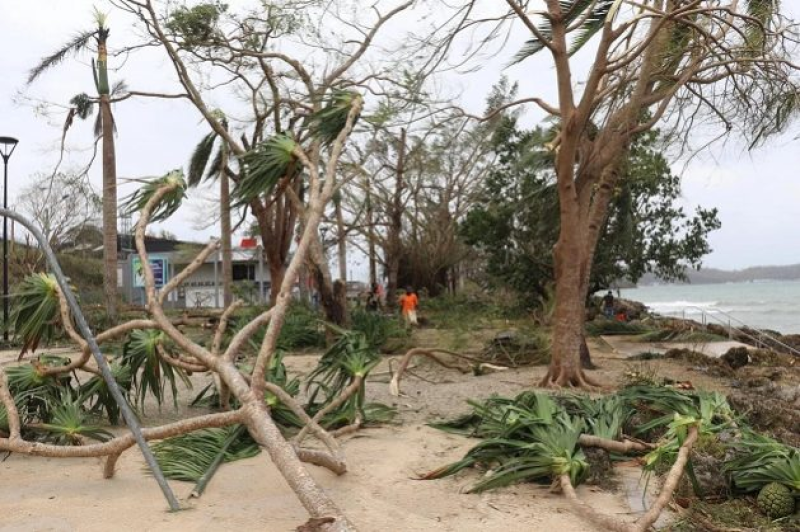- Trump says US aims to destroy Iran's military, topple government |
- Stock indices rally at DSE, CSE despite shrinking turnover |
- Tehran hits back across region after US and Israel attack Iran |
- African Union calls for restraint in Middle East |
- Iran-Israel Tensions Stoke Energy Risks for Bangladesh |
ICJ ruling marks key moment for climate and health justice

Cyclone damage in Vanuatu.
Legal experts in international law are interpreting the scope and impact of a landmark advisory opinion on climate change issued by the International Court of Justice (ICJ), which stated that states have a duty to prevent significant environmental harm.
The court ruling says states have a responsibility to cooperate internationally to prevent the impacts of climate change. Although it did not directly link climate change to the health crisis, it recognized the health aspect through the “right to a clean, healthy, and sustainable environment.” Organizations advocating for health-related climate action say the court’s opinion affirms that the climate crisis is also a health crisis.
Yamide Dagnet, Senior Vice President at the Natural Resources Defense Council (NRDC), noted that the advisory opinion made three things clear:
All countries have an obligation to address climate change under international and customary laws, beyond their commitments under the Paris Agreement.
It provides legal leverage to seek reparations from major emitters, including the fossil fuel industry.
Small island states will retain their statehood even if their land disappears due to sea level rise—as highlighted by the Rising Nation Initiative, Global Centre for Climate Mobility—thus supporting their efforts to preserve sovereignty, rights, and cultural heritage with dignity.
Dr. Jeni Miller, Executive Director of the Global Climate and Health Alliance, said the court delivered a historic affirmation that the climate crisis is a health crisis—and failure to act is a failure to protect life.
“This ruling confirms that governments and corporations have a legal duty to prevent further harm, uphold the right to health, and safeguard future generations,” she said. “From deadly heat and toxic air to disease and displacement, the Court’s message is clear—human health is not collateral damage.”
The ICJ issued its ruling on July 23 in response to a United Nations General Assembly resolution led by Vanuatu, a small island nation in the Pacific, which sought an advisory opinion on states’ obligations to address climate change and its legal consequences.
Following a long hearing last December, the ICJ delivered its first opinion on climate change. “The case was unlike any previously before the court,” said ICJ President Judge Yuji Iwasawa while reading the court’s unanimous advisory opinion. “This case was not simply a legal problem but an existential problem of planetary proportions that imperils all forms of life and the very health of our planet.”
While addressing planetary health, the court outlined the impact of human-induced climate change on growing health concerns. The ruling acknowledged participants’ discussions about the right to a clean, healthy, and sustainable environment.
During the hearing, Dr. Tedros Adhanom Ghebreyesus testified that climate change is fundamentally a health crisis. “The climate crisis is among the most significant health challenges facing humanity today,” he said.
Experts believe that health workers and advocates now have powerful legal backing to demand bold, science-based climate action rooted in justice. They are reviewing the court’s opinion for deeper analysis and say it marks a pivotal moment for climate and health justice.
Shweta Narayan, Campaign Lead at the Global Climate and Health Alliance, said the ruling affirms the urgency of comprehensive, rights-based action that addresses both immediate health harms and the root causes of the crisis.
“This represents a major step forward in reframing the climate crisis as fundamentally a health crisis—and in mobilizing the legal, scientific, and political tools needed to respond,” she added.
“This ruling strengthens the moral mandate to place health at the center of climate negotiations, including in adaptation, loss and damage, and climate finance frameworks.”
The court used a human rights approach to address the health aspects of climate change. Vanuatu, which led the campaign for the opinion, welcomed the ruling.
“The opinion integrates international human rights law, identifying the rights to life, health, an adequate standard of living, and the right to a clean, healthy, and sustainable environment as directly threatened by climate change,” the Vanuatu Climate Justice Program said. “It affirms that environmental protection is a precondition for their enjoyment.”
Dagnet added that the ruling demonstrated the power of activism.
“The students of Vanuatu dared to dream big and challenge the status quo, and it paid off with what could become one of the most important milestones in the global climate fight. I am thrilled at the landmark ICJ decision validating some of the most ambitious climate priorities championed by vulnerable states over the last 50 years.”

